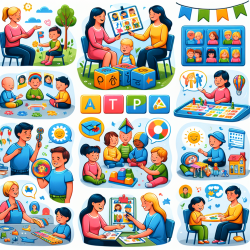In the evolving landscape of special education, the need for effective and accessible speech therapy services is more pressing than ever. As educational psychologists, we are acutely aware of the critical role speech therapy plays in the development and success of students with Individualized Education Programs (IEPs). However, the challenge of staffing shortages in speech therapy is a significant barrier that schools across the country face.
Research indicates that the demand for qualified speech therapists far exceeds the supply, creating a gap that can have profound implications on the educational outcomes for students. In this context, it is imperative to explore innovative solutions that can bridge this gap and ensure that every student receives the support they need.
One promising solution that has emerged in recent years is the use of online therapy services. Companies like TinyEYE are at the forefront of this movement, providing schools with access to certified speech therapists through a digital platform. This approach not only addresses the issue of staffing shortages but also offers several additional benefits:
- Accessibility: Online therapy services can reach students in remote or underserved areas where it may be challenging to find qualified therapists.
- Flexibility: Scheduling sessions can be more flexible, accommodating the varied needs of students and schools.
- Consistency: Continuity of care is enhanced as students can receive therapy from the same therapist regardless of geographical barriers.
- Data-Driven Insights: Digital platforms often include tools for tracking progress and outcomes, providing valuable data for IEP reviews and adjustments.
Despite these advantages, it is crucial to approach the implementation of online therapy services with a research-driven mindset. Educational psychologists play a pivotal role in evaluating the efficacy of these services and ensuring they meet the high standards required for student support. Key considerations include:
- Evidence-Based Practices: Ensuring that the therapy provided aligns with evidence-based practices and is tailored to the individual needs of each student.
- Training and Support: Providing adequate training for both therapists and school staff to effectively utilize the online platform.
- Parental Involvement: Engaging parents in the therapy process to foster a collaborative approach to student development.
- Continuous Monitoring: Regularly assessing the impact of online therapy on student outcomes and making data-informed adjustments as needed.
As we navigate the complexities of special education, it is essential to remain informed and proactive in seeking solutions that enhance the educational experiences of our students. The integration of online therapy services represents a significant step forward in addressing speech therapy staffing shortages and ensuring that all students have access to the support they need to thrive.
In conclusion, the role of educational psychologists in this landscape cannot be overstated. By leveraging research-driven approaches and embracing innovative solutions like online therapy services, we can make a meaningful difference in the lives of students with IEPs. It is through our collective efforts that we can overcome the challenges of staffing shortages and pave the way for a more inclusive and supportive educational environment.










